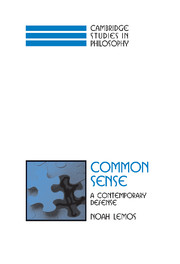Book contents
- Frontmatter
- Contents
- Acknowledgments
- Preface
- 1 The Common Sense Tradition
- 2 Common Sense and Reliability I
- 3 Common Sense and Reliability II
- 4 Reid, Reliability, and Reid's Wrong Turn
- 5 Moore, Skepticism, and the External World
- 6 Chisholm, Particularism, and Methodism
- 7 Common Sense and A Priori Epistemology
- 8 Particularism, Ethical Skepticism, and Moral Philosophy
- Conclusion
- Selected Bibliography
- Index
8 - Particularism, Ethical Skepticism, and Moral Philosophy
Published online by Cambridge University Press: 22 August 2009
- Frontmatter
- Contents
- Acknowledgments
- Preface
- 1 The Common Sense Tradition
- 2 Common Sense and Reliability I
- 3 Common Sense and Reliability II
- 4 Reid, Reliability, and Reid's Wrong Turn
- 5 Moore, Skepticism, and the External World
- 6 Chisholm, Particularism, and Methodism
- 7 Common Sense and A Priori Epistemology
- 8 Particularism, Ethical Skepticism, and Moral Philosophy
- Conclusion
- Selected Bibliography
- Index
Summary
The previous chapters have focused on the common sense tradition and epistemology. We have been concerned primarily with the epistemological views of Reid, Moore, and Chisholm, and the main objections considered have dealt primarily with the epistemological status of the sorts of beliefs that common sense philosophers take as data. In this final chapter, I will take up certain issues in moral philosophy and consider these issues in light of what we have said about the common sense tradition.
There are, of course, certain similarities in the epistemological views of Reid, Moore, and Chisholm. They all reject skepticism about the external world and other minds. They all endorse some form of foundationalism, holding that there are some propositions that are known immediately or basically. But there are also areas of important disagreement. There are differences about the nature of perception and sensing. Furthermore, I think we may take them to hold different views about the nature of epistemic justification. Though all three hold some version of foundationalism, Reid may be taken as holding some form of externalist foundationalism, and Chisholm rejects such a view. With respect to the question, “What makes justified beliefs justified?” there is reason to think they would offer different answers.
When we turn to their moral philosophy, the situation is similar. There are certain similarities in the ethical or meta-ethical views of all three.
- Type
- Chapter
- Information
- Common SenseA Contemporary Defense, pp. 157 - 180Publisher: Cambridge University PressPrint publication year: 2004



